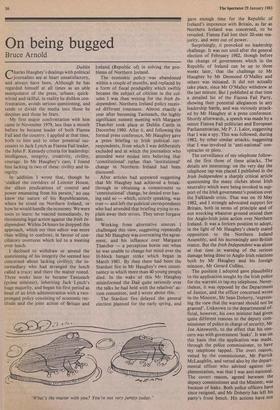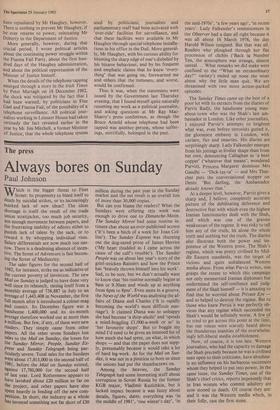On being bugged
Bruce Arnold
Dublin harles Haughey's dealings with political journalists are at heart unsatisfactory, and always have been. Although he has regarded himself at all times as an able manipulator of the press, urbane, quick- witted and skilful, in reality he dislikes con- frontation, avoids serious questioning, and tends to divide the media into .those he despises and those he fears.
My first major confrontation with him came in November 1979, less than a month before he became leader of both Fianna Fail and the country. I applied at that time, both to him and to other potential suc- cessors to Jack Lynch as Fianna Fail leader, the John F. Kennedy criteria for leadership: intelligence, integrity, creativity, civility, courage. In Mr Haughey's case, I found him lacking in two of these: civility and in- tegrity.
In addition I wrote that, though he
`stalked the corridors of Leinster House, the silken predications of control and power emanating from his person,' no one knew the nature of his Republicanism, where he stood on Northern Ireland, or how he would handle the economy. We were soon to learn: he reacted immediately, by threatening legal action against the Irish In- dependent. Within 24 hours he dropped this approach, which my then editor was more than willing to confront, in favour of con- ciliatory overtures which led to a meeting over lunch.
I declined to withdraw or amend the questioning of his integrity (he seemed less concerned about lacking civility); the in- termediary who had arranged the lunch called a truce; and there the matter rested. Three weeks later he became Taoiseach (prime minister), inheriting Jack Lynch's huge majority, and began his first period as head of an Irish administration with a two- pronged policy consisting of economic rec- titude and the joint action of Britain and Ireland (Republic of) in solving the pro- blems of Northern Ireland.
The economic policy was abandoned within a couple of months, and replaced by a form of fiscal prodigality which swiftly became the subject of citicism in the col- umn I was then writing for the Irish In- dependent. Northern Ireland policy receiv- ed different treatment. Almost exactly a year after becoming Taoiseach, the highly significant summit meeting with Margaret Thatcher took place at Dublin Castle in December 1980. After it, and following the formal press conference, Mr Haughey gave a press briefing to Irish political cor- respondents, from which I was deliberately excluded and at which the journalists who attended were misled into believing that `constitutional' rather than 'institutional' change in Northern Ireland had been discussed.
After articles had appeared suggesting that Mr Haughey had achieved a break- through in obtaining a commitment to `constitutional' change, he denied ever hav- ing said so — which, strictly speaking, was true — and left the political correspondents who had attended that briefing trying to ex- plain away their errors. They never forgave him.
Working from alternative sources I challenged this view, suggesting repeatedly that Mr Haughey was overstating the agree- ment, and his influence over Margaret Thatcher — a perception borne out when he was unable to change her mind over the H-block hunger strike which began in March 1981. By then there had been the Stardust fire in Mr Haughey's own consti- tuency in which more than 40 young people died. In the wake of this Mr Haughey misinformed the Dail quite seriously over the talks he had held with the relatives' ac- tion committee, and I wrote about this.
The Stardust fire delayed the general election planned for the early spring, and `What's the matter with you? You're not very jumpy today.' gave enough time for the Republic of Ireland's impotence with Britain, as far as Northern Ireland was concerned, to be revealed. Fianna Fail lost their 20-seat ma- jority, and went out of power.
Surprisingly, it provoked no leadership challenge. It was not until after the general election of February 1982, though before the change of government which in the Republic of Ireland can be up to three weeks later, that the challenge to Mr Haughey by Mr Desmond O'Malley and others was initiated. It did not actually take place, since Mr O'Malley withdrew at the last minute. But I published at that time a detailed list of the Fianna Fail Party, showing their potential allegiances in any leadership battle, and was viciously attack- ed by Mr Haughey at a press conference. Shortly afterwards, a speech was made by a senior Fianna Fail politician and European Parliamentarian, Mr P. J. Lalor, suggesting that I was a spy. This was followed, during 1982, by other similar attacks, suggesting that I was involved in 'anti-national' con- spiracies or plots.
The surveillance of my telephone follow- ed the first three of these attacks. The details are interesting: on the very day the telephone tap was placed I published in the Irish Independent a sharply critical article questioning the many cliches about Irish neutrality which were being invoked in sup- port of the Irish government's position over the Falklands crisis. That was on 10 May 1982, and 1 strongly advocated support for Britain, both in terms of principle and of not wrecking whatever ground existed then for Anglo-Irish joint action over Northern Ireland. It was a forlorn position to adopt, in the light of Mr Haughey's clearly stated opposition to the Northern Ireland Assembly, and his increasingly anti-British stance. But the Irish Independent was alone at that time in warning of the serious damage being done to Anglo-Irish relations both by Mr Haughey and his foreign minister, Mr Gerard Collins.
The position I adopted gave plausibility to the application sought by the Irish police for the warrant to tap my telephone. Never- theless, it was opposed by the Department of Justice, and the officer concerned wrote to the Minister, Mr Sean Doherty, 'express- ing the view that the warrant should not be granted'. Unknown to the departmental of- ficial, however, his own minister had given quite different reasons to the deputy com- missioner of police in charge of security, Mr Joe Ainsworth, to the effect that his con- cern was with government 'leaks'. It was on this basis that the application was made, through the police commissioner, to have my telephone tapped. The overt reason, vetted by the commissioner, Mr Patrick McLaughlin, and vetted also by the depart- mental officer who advised against im- plementation, was that I was anti-national. The covert reason, agreed between the deputy commissioner and the Minister, was because of leaks. Both police officers have since resigned, and Mr Doherty has left his party's front bench. His actions have not
been repudiated by Mr Haughey, however. There is nothing to prevent Mr Haughey, if he ever returns to power, reinstating Mr Doherty in the Department of Justice.
More generally, however, during that crucial period, I wrote political articles about the continuing power struggle within the Fianna Fail Party, about the first hun- dred days of the Haughey administration, and about the political opportunism of the Minister of Justice himself.
When the details of the telephone tapping emerged through a story in the Irish Times by Peter Murtagh on 18 December 1982, the shock was mitigated by the fact that I had been warned, by politicians in Fine Gael and Fianna Fail, of the possibility of a telephone surveillance. All political jour- nalists working in Leinster House had taken seriously the fact revealed earlier in the Year by Mr Jim Mitchell, a former Minister of Justice, that the whole telephone system
used by politicians, journalists and parliamentary staff had been activated with `over-ride' facilities for surveillance, and that these facilities were available to Mr Haughey through special telephone installa- tions in his office in the Dail. More general- ly, Mr Haughey, with his curious ability for blunting the sharp edge of one's disbelief by his bizarre behaviour, and by his frequent and emphatic claims that he knew 'every- thing' that was going on, forewarned me and others that the rumours, and worse, would be confirmed.
Thus it was, when the statements were issued by the Government last Thursday evening, that I found myself quite naturally resuming my work as a political journalist, and asking questions at Mr Ray Mac- Sharry's press conference, as though the Bruce Arnold whose telephone had been tapped was another person, whose suffer- ings, mercifully, belonged in the past.







































 Previous page
Previous page